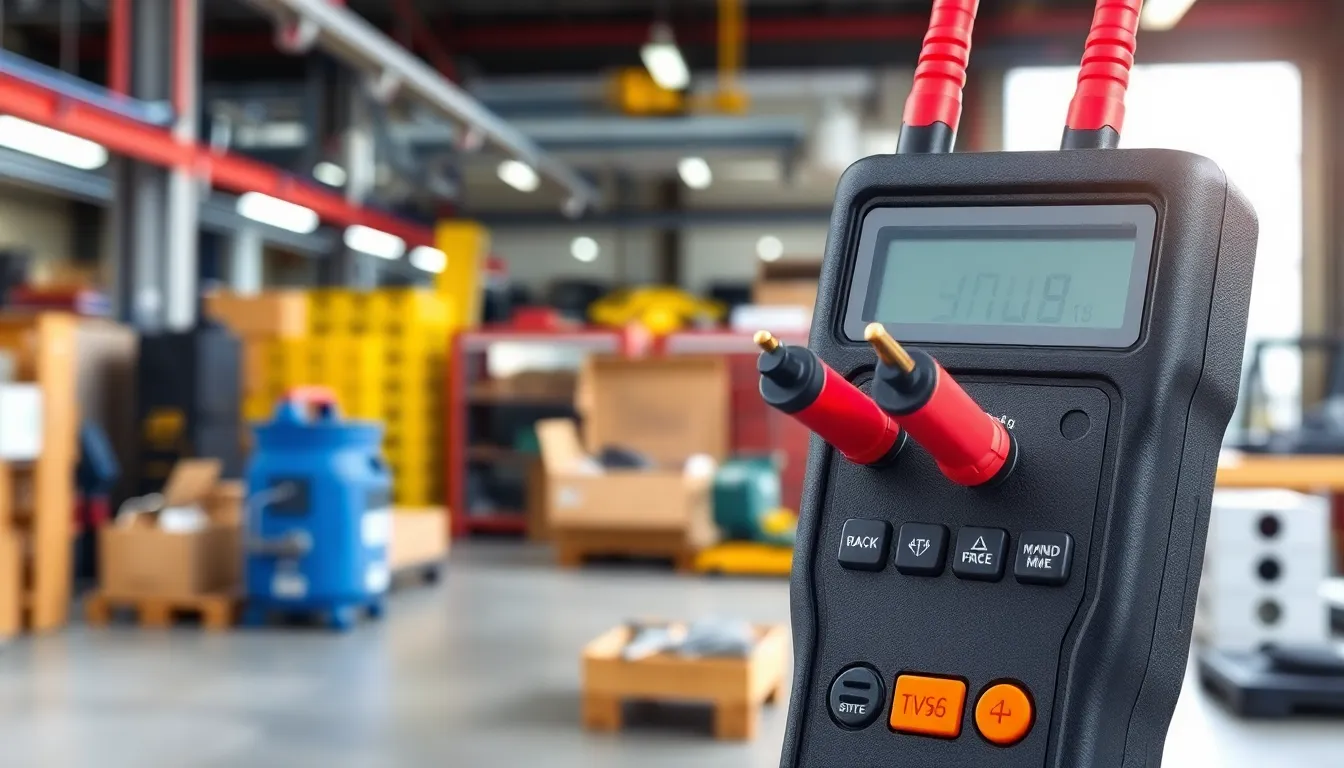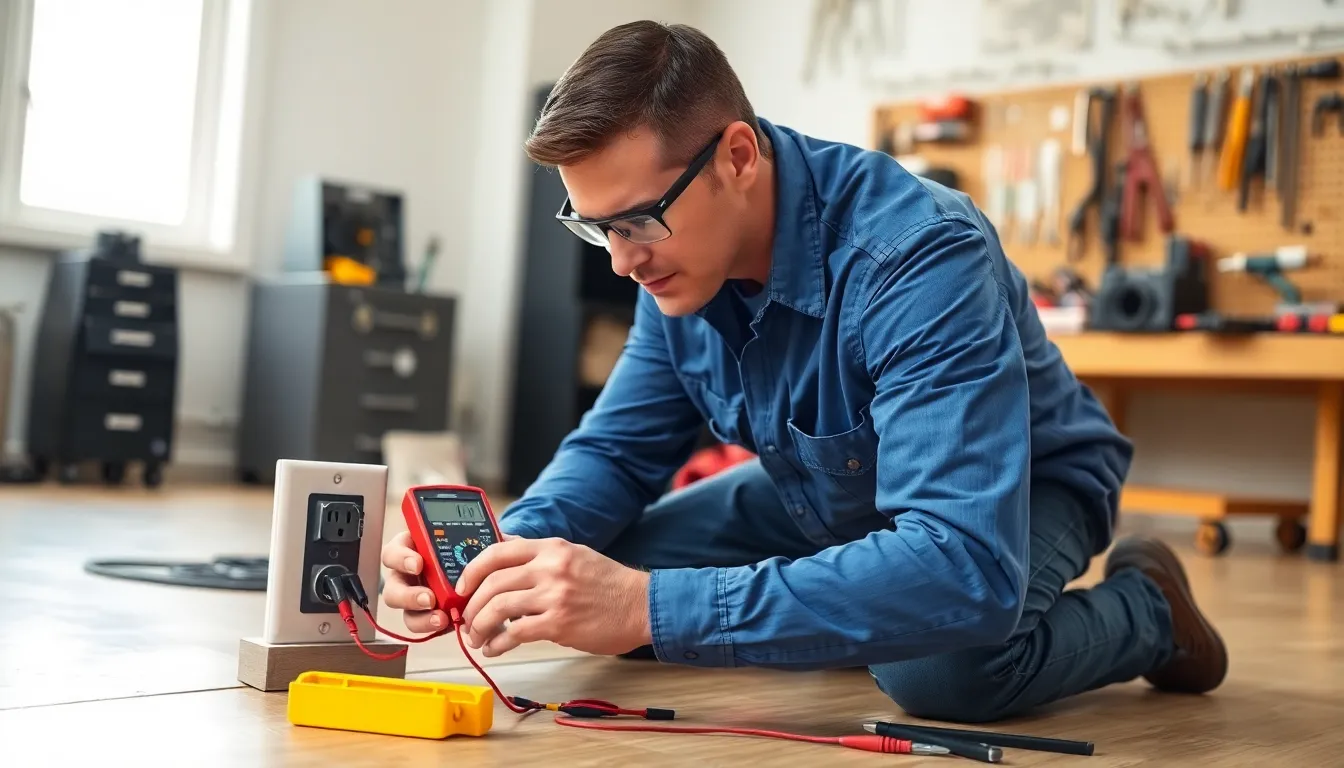When it comes to electrical work, having the right tools can make all the difference. Enter the electrical tester, the unsung hero of the toolbox. Whether it’s a simple flicker in the lights or a full-blown power outage, this nifty gadget helps diagnose issues faster than you can say “short circuit.”
Table of Contents
ToggleOverview of Electrical Testers
Electrical testers serve as essential tools for diagnosing a variety of electrical issues. These instruments help identify problems quickly, from minor flickering lights to significant power outages.
What Are Electrical Testers?
Electrical testers are devices designed to detect voltage, current, and resistance within electrical circuits. Technicians rely on these tools to assess whether circuits are functioning correctly and safely. Usage often includes checking outlets, breakers, and equipment. Understanding tester readings ensures appropriate electrical repairs and maintenance.
Types of Electrical Testers
Different types of electrical testers cater to various diagnostic needs. Common types include:
- Multimeters measure voltage, current, and resistance in one device.
- Voltage testers identify the presence of voltage in circuits.
- Circuit testers verify the integrity of electrical circuit connections.
- GFCI testers check ground fault circuit interrupter safety.
- Clamp meters evaluate current without direct contact with wires.
Each tester has specific applications, making it crucial to choose the right one for the task.
Key Features to Consider

Electrical testers come packed with features that significantly influence their effectiveness. Potential users should evaluate these key aspects to ensure they select a suitable device.
Accuracy and Precision
Accuracy ranks as a top priority in electrical testing. Testers must deliver precise readings to ensure safety and reliability. Many models feature digital displays that provide clear numeric values. Analog options also exist, yet digital testers often outperform them in accuracy. Additionally, testers with auto-ranging functions simplify the measurement process by adjusting settings automatically, enhancing user experience. Checking for testers that meet industry standards, such as IEC 61010, guarantees reliability in measurements.
Durability and Build Quality
Durability plays a crucial role in the performance of electrical testers. Users often encounter harsh working conditions, so testers should withstand drops, moisture, and dust exposure. Many high-quality models incorporate rubber grips and protective casings that enhance resilience. Choosing testers with reinforced housings helps prevent damage during use. Furthermore, selecting models with certifications such as IP ratings indicates superior protection against environmental factors.
Ease of Use and Readability
Ease of use significantly impacts efficiency during testing. Intuitive interfaces streamline operations, catering to both professionals and beginners. Large screens or backlit displays aid visibility in poorly lit areas. Controls that are easy to navigate ensure quick access to essential functions. User-friendly features like color-coded probes simplify identification, allowing for quicker connections to circuits. When considering testers, prioritizing readability and ease of use enhances overall effectiveness.
Popular Brands and Models
The market features various brands and models of electrical testers, each catering to different needs.
Brand A Review
Fluke stands out as a highly regarded brand in electrical testers. Known for its durability and accuracy, Fluke testers deliver reliable performance. The Fluke 117, for instance, is a popular model designed for electricians. This digital multimeter features a non-contact voltage detector, making it ideal for both residential and commercial applications. Users appreciate its large, easy-to-read display and ergonomic design. Moreover, the built-in features like automatic ranging simplify the process, enhancing overall efficiency while diagnosing electrical issues.
Brand B Review
Klein Tools is another trusted name in electrical testing. Their tools are designed with the professional in mind. The Klein MM400 multimeter excels with its wide range of features, including temperature measurement, making it versatile in various situations. Its rugged build withstands tough conditions, ensuring longevity on the job. Users often highlight the helpful backlit display, ensuring readability in low-light environments. Klein Tools consistently focuses on user-friendly interfaces, allowing technicians to work more efficiently.
Brand C Review
Extech Instruments offers innovative solutions for electrical testers, catering to specific needs. The Extech EX330 is a compact multimeter favored for its affordability and functionality. It provides extensive measurements, such as AC/DC voltage and current, resistance, and even capacitance. This multimeter’s compact size and lightweight design make it convenient for fieldwork. Users commend its intuitive layout, which aids in quick assessments, contributing to overall productivity. Extech’s commitment to providing quality instruments makes it a solid choice for both professionals and DIY enthusiasts.
Applications of Electrical Testers
Electrical testers serve numerous applications in various environments, from home settings to professional workplaces. Their versatility aids in diagnosing electrical issues, ensuring safety and efficiency.
Home Use
For homeowners, electrical testers simplify routine maintenance tasks. Individuals often use these devices for checking outlets and switches to ensure they’re functioning correctly. Testing light fixtures for voltage can prevent unwelcome surprises during repairs. GFCI testers help verify that ground fault circuit interrupters function properly, reducing the risk of electrical shock. Additionally, simple voltage testers allow for quick checks of battery-operated devices and appliances, ensuring everything runs smoothly.
Professional Use
Electricians rely on electrical testers for accurate assessments. They utilize multimeters and clamp meters to measure voltage, current, and resistance in circuits. Professionals often employ circuit testers to inspect circuit breakers, identifying potential faults before they escalate. Safety inspectors also utilize GFCI testers to ensure compliance with electrical codes and standards during inspections. Each tool contributes to the overall efficiency and safety of electrical work in commercial and industrial settings.
Electrical testers are indispensable tools for anyone involved in electrical work. Their ability to quickly diagnose issues ensures safety and efficiency in both home and professional settings. With various types available each designed for specific applications choosing the right tester can make all the difference.
Investing in a quality electrical tester not only enhances accuracy but also promotes reliability in measurements. As technology advances the features of these devices continue to improve making them even more user-friendly and effective. Whether for routine maintenance or complex troubleshooting having the right electrical tester is essential for achieving optimal results in any electrical project.




